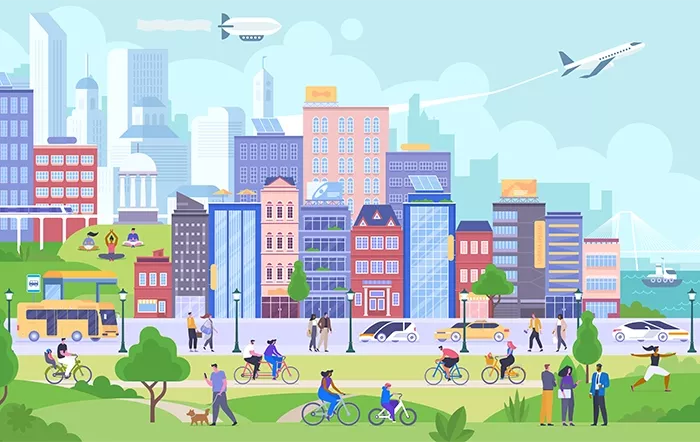Nifty at Fifty: How Oxford’s Transport Studies Unit has been informing our transport systems over the last 50 years

What does an energy efficient transport system look like? Will electric vehicles stop climate change? What transport injustices exist in our societies? How do we change behaviours towards low-carbon forms of transport? Are transport and wellbeing connected? And, what role can travel play in achieving better public health and meeting the UN’s SDGs?
These are just a few of the questions currently being addressed by the University of Oxford’s Transport Studies Unit (TSU), a research institute that puts just and human-centered mobility futures at the heart of its research. Founded in 1973 through an endowment of the then Chartered Institute of Transport, the TSU is now part of Oxford’s School of Geography and the Environment and this year celebrates 50 years of research excellence.
Since its inception the unit’s work has made a difference within society on local, national and global levels, receiving commissions from the likes of the Department for Transport, Oxford Bus Company and TRL. The unit’s first research grants covered topics from household travel behaviours (funded by the Social Science Research Council) to the value of time in developing countries (funded by the TRL Limited). In April 1977 an authored letter by the then Director (Dr Ian Heggie, Reader in Transport Economics) commenting on the Government’s proposed rural bus experiments was published in The Economist and caught the eye of the shadow transport minister. This was quoted in the House and was the start of the unit’s ongoing work to inform policy and change practice through expert advisory roles.
Today the TSU has become a globally renowned centre of research excellence and it continues to transform lives for the better through scientific evidence that centres on four core transport themes. These include social inequalities and justice, health and wellbeing, energy, climate and the environment, and planning, policy and government. Its current research portfolio spans 13 active research projects across four continents. The TSU’s interdisciplinary experts are equipped to respond to changes in the challenges faced by the sector with backgrounds in geography, urban studies, planning, architecture and engineering. Its main funding sources come from UK Research and Innovation (UKRI) - including the Economic and Social Research Council (ESRC), Engineering and Physical Sciences Research Council (EPSRC) and Innovate UK - as well as research councils in European countries, organisations such as the ADB, ASEAN, WHO, OECD and UN Habitat, and charities.
In policy, it continues to inform decision makers, as well as firms, corporations, NGOs and other third sector organisations on the injustices or impracticalities in our transport systems. Recent published briefs have covered topics from the UK’s local community transport provision to opportunities and obstacles for electric vehicle sharing, and payment systems of auto-rickshaw operator-drivers in India.
The international and interdisciplinary nature of the TSU's science and research is also reflected in the range of postgraduate research undertaken by its students. These projects range from gendered mobilities in Pakistan, to cycling infrastructures in China, to minibus taxi reform in South Africa and the role indigenous knowledge may play in reconfiguring transport planning strategies in Latin America.
In 2013, the TSU launched its executive education programme, which has provided decision-makers from a wide range of sectors with the skills and expertise they need to address the complex challenges facing sustainable transport futures in their countries. Its four courses tackle some of transport’s biggest global challenges, which include health and wellbeing, smart technologies, infrastructures and climate change.
Commenting on the TSU’s 50th anniversary Tim Schwanen, Director of the Transport Studies Unit and Professor of Transport Geography and the University of Oxford said: “The 50th anniversary is an excellent moment to reflect on not only the achievements of past and current TSU researchers, but also the changes in the field of transport and mobility researchers and how both the Unit and the field need to adapt to current and future challenges to mobility systems. The climate emergency is no doubt the biggest of all of them.”
To find out more about the life and work of Oxford’s Transport Studies Unit, visit: https://www.tsu.ox.ac.uk/
To read the latest insight by Tim Schwanen, including expert commentary on the current state of the transport sector and what needs to happen next, see: https://www.ox.ac.uk/news/2023-06-29-expert-comment-we-are-hooked-toxic-transport-addiction-time-break-habit
For a summary of the unit’s most recent work download the 2022 annual report: https://www.tsu.ox.ac.uk/sites/default/files/2023-04/TSU-Annual-Report-2022.pdf
For further information or general enquiries contact: enquiries@tsu.ox.ac.uk
Nifty at Fifty: How Oxford’s Transport Studies Unit has been informing our transport systems over the last 50 years
What does an energy efficient transport system look like? Will electric vehicles stop climate change? What transport injustices exist in our societies? How do we change behaviours towards low-carbon forms of transport? Are transport and wellbeing connected? And, what role can travel play in achieving better public health and meeting the UN’s SDGs?
These are just a few of the questions currently being addressed by the University of Oxford’s Transport Studies Unit (TSU), a research institute that puts just and human-centered mobility futures at the heart of its research. Founded in 1973 through an endowment of the then Chartered Institute of Transport, the TSU is now part of Oxford’s School of Geography and the Environment and this year celebrates 50 years of research excellence.
